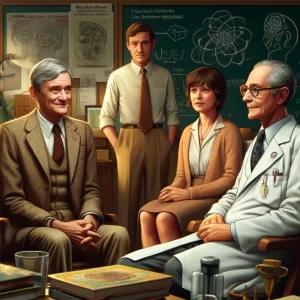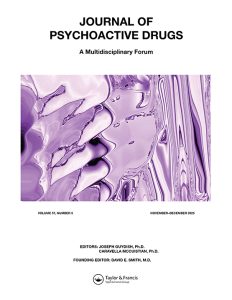- Part One: Belladonna and the White Light Experience
- Part Two: The First LSD Experiments for Alcoholism
- Part Three: Bill Wilson Uses LSD for the first Time
- Part Four: Bill Wilson Revisits Childhood Trauma in Group LSD Experience
- Part Five: Bill Wilson and LSD gets AA Pushback
 Within a few months of this first session with LSD, Bill Wilson now does his first group LSD experience where everyone participating took lower doses of LSD. Present is Bill Wilson, Tom Powers, Dr. Betty Eisner (therapist) and Dr. Sidney Cohen (who was the researcher present for Bills first experience the previous August.) Later Betty’s husband Will, who didn’t partake, arrives, and tries to connect with Bill about their mutually shared struggles with depression. Followed is some of the notes taken by Betty and compiled for an unpublished book entitled “Remembrances of LSD Therapy Past.”
Within a few months of this first session with LSD, Bill Wilson now does his first group LSD experience where everyone participating took lower doses of LSD. Present is Bill Wilson, Tom Powers, Dr. Betty Eisner (therapist) and Dr. Sidney Cohen (who was the researcher present for Bills first experience the previous August.) Later Betty’s husband Will, who didn’t partake, arrives, and tries to connect with Bill about their mutually shared struggles with depression. Followed is some of the notes taken by Betty and compiled for an unpublished book entitled “Remembrances of LSD Therapy Past.”
“When I talked to Tom about his coming out…the idea of all of us taking 25 gamma experimentally to see what would happen. Since all of us had had it at least once — in larger doses, it would be interesting, I thought, to see what the small dose would do… So unconsciously or rather half consciously I probably had hopes of help from Tom either in the problem area or in the integrative…
But when W.W. (Wilson) walked into the den…I knew this was his session…
Sid was waiting for us in his office at the hospital and there were warm greetings to Tom and Wilson. At 12:20 we took the drug…Wilson had taken 50 gamma — the rest of us 25. When offered the little blue pills and was told by Sid to take what he wanted, he said — ‘Never say that to a drunk,’ and took two…it was 35 minutes later when he said he felt stirred by the music, and 10 minutes after that when he began talking. Throughout the session he rarely would admit feeling the drug or its action, but about the time he started talking quite a bit in a more relaxed way his face changed, he looked much younger, and the tension began to go.”
“Tom and I took alternating roles of therapists; Sid for the most part sat very quietly. I felt pulled in different directions at times by the three of them…the problems seemed to be in the mother-father area from the masculine aspect. Sid was very open to the whole thing…and I felt that many of the things which were said to Wilson he felt were said to him, too. And Tom seemed to identify a great deal with the problem and at one point cried. Wilson came close only twice — once in relation to his mother and once with his father, I believe. I kept having the feeling that my role was that of therapist — this wasn’t my time to experience the drug, and then I consequently examined myself as to whether this were a defense against the drug…”
“…Gregorian Chants, and these moved Tom profoundly. He seemed to take onto himself the suffering of humanity and particularly with respect to a mental hospital…I think he actually was open to the surrounding suffering and as such felt it. This is important with respect to where we hold our massive LSD experiments…”
“I hesitate to enter into the dynamics of the problem(s) as they were uncovered. I do think that there were two important parts, though — Wilson’s experience of himself as unloved — and the perception that it was not through himself but because of his parents that this occurred…It was interesting to see how the therapy went — at times I felt that Tom jumped too many levels and lost Wilson; at times he felt that I was off the beam…”
“At about four or shortly after Wilson seemed to be coming out and rebuilding his defenses (but one can still get through, Tom — as we found at dinner: both Will and I did.)…Sid had to go to a military ball, and so we decided to leave. Now that the session was over, I suddenly began to feel the drug — four hours after I had taken it. (Both Tom and I had full LSD reactions 5 hours after the drug had been administered.)…I really didn’t feel that I should drive, but Wilson is ticky in LA and Tom wasn’t in much better shape than I. So I crawled down San Vicente concentrating on all aspects of driving and had a terrible time figuring out where to go…But we finally made it to Tali’s, and while we sat drinking and talking the drug really hit me. The color and room approached and receded in waves — it was just like the first time I had had the drug from the sensory aspect — the slugging on the back of the head, the nausea, etc. And I knew I was in for a bad reaction because there wasn’t the concomitant freeing experience.”
“I felt progressively worse as we came home — and since the sitter had to leave almost immediately, I was projected like a missile into the domestic situation. Nothing was done that should have been done, and everything was a mess, which I tried to keep from Tom and Wilson (the old perfect hostess operating) and I felt worse and worse and worse…But I couldn’t put a name or reason to it — there didn’t seem to be anything related to my suffering…I had to retire to the bedroom…I sobbed and sobbed in terrible anguish over — I didn’t know what! And I still don’t really. Tom suggested that it might have been a reaction from the session since I was carrying a heavy load of masculinity — one of me and three of them…”
“So — Will came home and we had drinks — hard and soft — and talked and talked. And then to the Miramar for dinner where Will really got through to Wilson a couple of times on the bridge between them of depression. I got through to him once, too, although Tom didn’t think we could do it… And we talked about trust, and the difficulty is that Wilson doesn’t trust anybody: he can’t let them close because he doesn’t trust himself — that he may kill them, in effect. Because those of us with ‘paranoid’ tendencies will kill before being killed, and the ‘depressive’ will kill himself first. And I think that is all there is to different psychiatric classifications in this area. And perhaps there is only one: the ego when attacked will defend itself to the death. And this violence and basic urge to kill (basic to the ego, not the self) is so appalling to the ‘depressive’ that he shrinks back and turns the point of the weapon toward himself while the ‘paranoid’ on the other had tries to rationalize it and make a pretty picture of it for society or whoever to see…”
“And when we got home at one or after I was still so disturbed and upset and in such suffering I cooked until 3 and soon I felt peace and release and back to creative reality again. Cooking is a sacrament; I never knew before.”
What is interesting about this session and how it may relate to our group, Psychedelics in Recovery, is in regard to childhood trauma. Bill Wilson, now with over 20 years of continuous sobriety from alcohol and under the effects of LSD begins to speak of his mother and his father “Wilson’s experience of himself as unloved — and the perception that it was not through himself but because of his parents that this occurred” and later the conversation shifts into distrust “And we talked about trust, and the difficulty is that Wilson doesn’t trust anybody: he can’t let them close because he doesn’t trust himself”
What is never mentioned in the Big Book, nor the Twelve and Twelve of AA, is Bills childhood. Even Bills Story begins when Bill is about 20 years old and so we are left to start with that. In later years, biographies have come out detailing more of his unique childhood. Bill himself almost never speaks of it. An unpublished first version of Bill’s Story written in 1938 begins with a simple sentence.
“When I was about ten years old my Father and mother agreed to disagree and I went to live with my Grandfather, and Grandmother”-Bill’s Story, unpublished version 1938
Later biographies expand on that simple sentence and put more light into the difficulties of Bill’s relationship, or lack thereof, with his parents.
“Then it was that Mother told us that Father had gone for good. To this day, I shiver every time I recall that scene on the grass by the lakefront. It was an agonizing experience for one who apparently had the emotional sensitivity that I did. I hid the wound, however, and never talked about it with anybody, even my sister.” – Pass it On
His father took a job out west and never returned. Later, as a result of the divorce, Bill’s mother dropped him and sister off to live with their grandparents so she could move to Boston and study osteopathy.
“Although Bill and Dorothy loved their grandparents, who were very good to them, they felt abandoned. Bill was especially devoted to his father and badly missed him after he moved to the West. . . . The separation made him feel set apart and inferior to youngsters who lived with a mother and father.
And now Emily, too, went away from East Dorset. Leaving Bill and Dorothy in the full-time care of their grandparents, she moved to Boston to go back to school — specifically, osteopathic college.”- Pas it On
During the formation of AA and its later decades, little was known about childhood trauma and how that can affect someone for years. But apparently it has affected Bill. Whereas this was apparently something that he rarely discussed, he now discusses it with 3 others who are undergoing an LSD therapy session together. Alcoholics Anonymous has done wonders for many who have struggled with alcoholism and addiction. But, at the time of its writings there was essentially no such thing as trauma therapy. Bill Wilson has experienced several years now of working with a Dr, a Jesuit Priest and a Jungian Therapist as described in several paragraphs earlier. It is interesting to note that only one of these, Dr. Tiebout, acknowledges anything suggesting that his childhood may still be affecting him. Unfortunately, it’s not very empathetic…” he had been trying to live out the infantilely grandiose demands of ‘His Majesty the Baby’”
It would be assumed in the decades prior to the LSD experiences that Bill Wilson probably attempted to do step work on his depression and perhaps even his difficulties of his childhood. And so, we should look there for answer. In the AA literature, we are encouraged to do a personal inventory of wrongs done.
“Though we did not like their symptoms and the way these disturbed us, they, like ourselves, were sick too. We asked God to help us show them the same tolerance, pity, and patience that we would cheerfully grant a sick friend. When a person offended we said to ourselves, “This is a sick man. How can I be helpful to him? God save me from being angry. Thy will be done.”
We avoid retaliation or argument. We wouldn’t treat sick people that way. If we do, we destroy our chance of being helpful. We cannot be helpful to all people, but at least God will show us how to take a kindly and tolerant view of each and every one.
Referring to our list again. Putting out of our minds the wrongs others had done, we resolutely looked for our own mistakes. Where had we been selfish, dishonest, self-seeking and frightened? Though a situation had not been entirely our fault, we tried to disregard the other person involved entirely. Where were we to blame? The inventory was ours, not the other man’s. When we saw our faults we listed them. We placed them before us in black and white. We admitted our wrongs honestly and were willing to set these matters straight.” -Alcoholics Anonymous
For many people who have experienced childhood or adult trauma, physical, emotional, sexual, or spiritual abuse, abandonment, addictive parents, or dysfunctional upbringings and who enter into AA, we are also faced with this 4th step inventory and some of its suggestions. There has been many a well-meaning sponsor who is trying to help a member directly out of the book who has made the following suggestions “I’m sorry that you were abused as a child, but the best we can do is pray for them and look at our own faults in the situation. Where had we been selfish, dishonest, self-seeking, and frightened?”
The previous is not to criticize AA nor its tremendous benefit that it has brought many millions. It is simply to say, that for some of us, simply reworking the steps is not enough to handle some of our deeper difficulties, especially with the more recent understandings of the effects of trauma, neglect, abuse and shame. And, it is possible, that even for Bill Wilson, founder of Alcoholics Anonymous, the steps were simply just not enough. And it just very well may be, that for the very first time, while under a low dose of LSD, Bill Wilson uttered a variation of the words “perhaps my difficulties did not begin with me…”
And for the next several years, Bill Wilson continued to experiment with LSD, along with his sponsee Tom Powers, Father Ed Dowling his Jesuit priest friend and spiritual mentor, Sam Shoemaker (the leader of the Oxford Group in America), his wife, AA secretary Nell Wing, and many others in AA.
“He invited many of his closest associates to join him in the experience. Those invited included Father Dowling, who accepted, Dr. Jack, who did not, and Sam Shoemaker. Bill reported to Shoemaker: “You will be highly interested to know that Father Ed Dowling attended one of our LSD sessions while he was here recently. On that day, the material was given to one of the Duke precognition researchers, a man now located in New York. The result was a most magnificent, positive spiritual experience. Father Ed declared himself utterly convinced of its validity, and volunteered to take LSD himself.”-Pass it On




